Lately, there’s been a growing awareness around plastic pollution in New Jersey. Perhaps this is due to the state’s upcoming plastic bag ban, which goes into effect on May 4, 2022. However, one NJ mom had her sights set on remedying this problem years prior. Rachel Garcia opened Dry Goods Refillery back in February 2020. The mission for her Maplewood store was to support a more sustainable supply chain, while eliminating single-use packaging and food waste. This concept proved so successful amongst residents that Garcia relocated in order to scale her business.
As of September 2021, Dry Goods Refillery now has a home in Montclair as NJ’s first plastic and package-free grocery store. For Garcia, it’s a dream realized. Shoppers can now find fresh produce, dairy, breads, home products—way more than just rice, beans and pasta. In addition, Dry Goods Refillery is continuing to make locally-made products more accessible and encouraging nearby businesses to rethink how they can reduce their own environmental footprint.
I recently caught up with Garcia to discuss Dry Goods Refillery’s expansion to Montclair, her thoughts on New Jersey’s plastic bag ban and how consumers can go about living a greener lifestyle.
The last time you spoke with us, Dry Goods Refillery was based in Maplewood. Now, it’s become a full-fledged sustainable grocery store in Montclair. How’s the transition been?
So, we opened officially in Montclair in September [2021]. We took what we did in Maplewood as a bit of a launchpad or proof of concept. We were able to get off the ground, see that there was demand and ultimately decided to open the real version of this convenient, one-stop-shop last year.
Montclair is a very forward-thinking town, and we already had a lot of customers coming from that direction just to visit us in Maplewood. So, we sought out a location, procured one last March and then opened up in September.
We actually had both shops for about two months. However, it became very clear that the full concept is what was driving the business and what we ultimately hope to replicate down the line…We closed the Maplewood location in October.
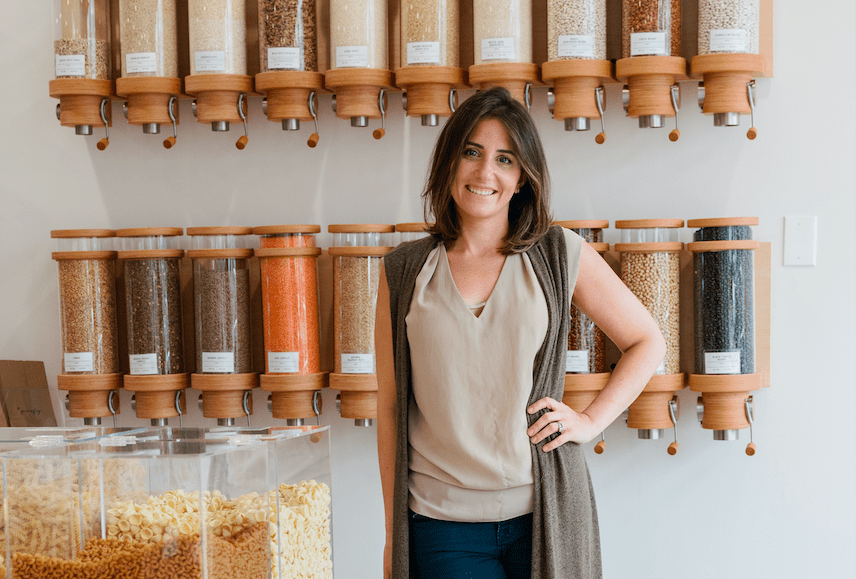
Rachel Garcia, Founder and Owner of Dry Goods Refillery in Montclair, NJ
In what ways does your concept today differ from what you were doing just a year prior?
The operation we have in Montclair is on a much larger scale. Physically, we have about eight times the floor space. In terms of breadth of assortment, we’ve now expanded it to what we hope is a more convenient, one-stop-shop with produce, eggs, dairy, cleaning products, self-care items—including things meant to minimize waste within the home.
We’ve been able to innovate in a way that wasn’t possible in our old space. We’ve taken the Montclair partnerships that we’ve had from the very beginning and built upon them to offer a lot more. For example, we work with Marcel for returnable jars for hummus. We also work with Paper Plane Coffee Co. for returnable cold brew coffee and Van Hook for cheese.
Expanding those partnerships has definitely proven to be the right decision. It allowed us to innovate and become more of a convenient location for customers shopping for many different categories.
However, what we started with is what we’re still most known for—dry goods. Things like beans, grains, pasta. As much as we really appreciated the opportunity to start our business in our first location, there were limitations because we were tucked away in the back of another store. We definitely categorize ourselves as a grocery now, yet we’ve stayed true to our core values—meaning there’s no single-use plastic or packaging.
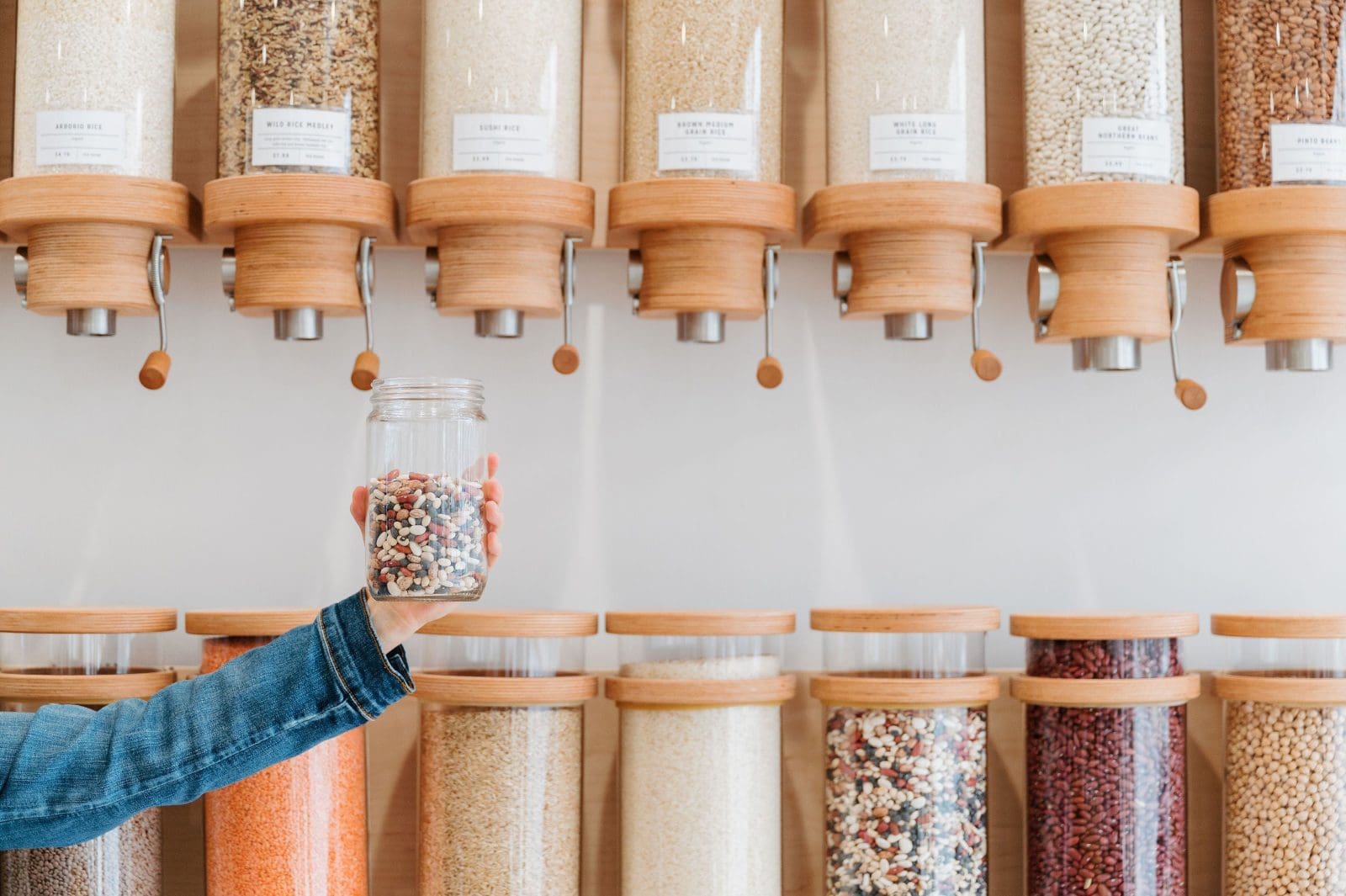
Dry Goods Refillery in Montclair, New Jersey
Since deciding to partner with more Montclair businesses, how would you say fostering these relationships has helped you build a stronger sense of community and customer base?
In addition to the refills, our job is to really open up our customers to more mission-based makers, small independents and female makers who are going above and beyond clean, delicious food. They’re also doing right by the planet and giving back…We really use the store as a way for customers to feel like no matter what they’re buying, they’re supporting what we believe is a more sustainable and independent, higher-quality supply chain.
We’ve had partnerships with Paper Plane and Le French Dad from the very first day. They both had their own touches of sustainability in place, but I think we’ve been able to push businesses like those even further. We shuffle reusable coffee containers back and forth between Paper Plane and Dry Goods—so there’s no waste at all. Similarly, we reuse the baguette and flour bags we get from Le French Dad and give them back to them. We’ve also pushed Van Hook to change the paper they use for the cheese they give to us because we refuse to use anything that’s lined with plastic.
With Marcel, a Mediterranean restaurant, we’ve encouraged them to use returnable glass jars with dishwasher-safe labels so that we could carry their hummus. They’ve been super receptive—and we did the same thing with Jana’s Jammies.
It sounds like these partnerships have become a driving force, not only for your business, but in creating real change locally.
It’s a relationship and we love that our store is a showcase of what our local community offers. Fortunately, we have a lot of customers that come from further away because of the novelty of the concept. So, we get people who come in maybe once a month from down the shore. Or, even our Maplewood customers will stop by and ask where they should go for lunch, and we’re happy to point them in the direction of our vendors. At this point, we easily have over a dozen partners within a 15-mile radius. So in that way, it’s mutually beneficial.
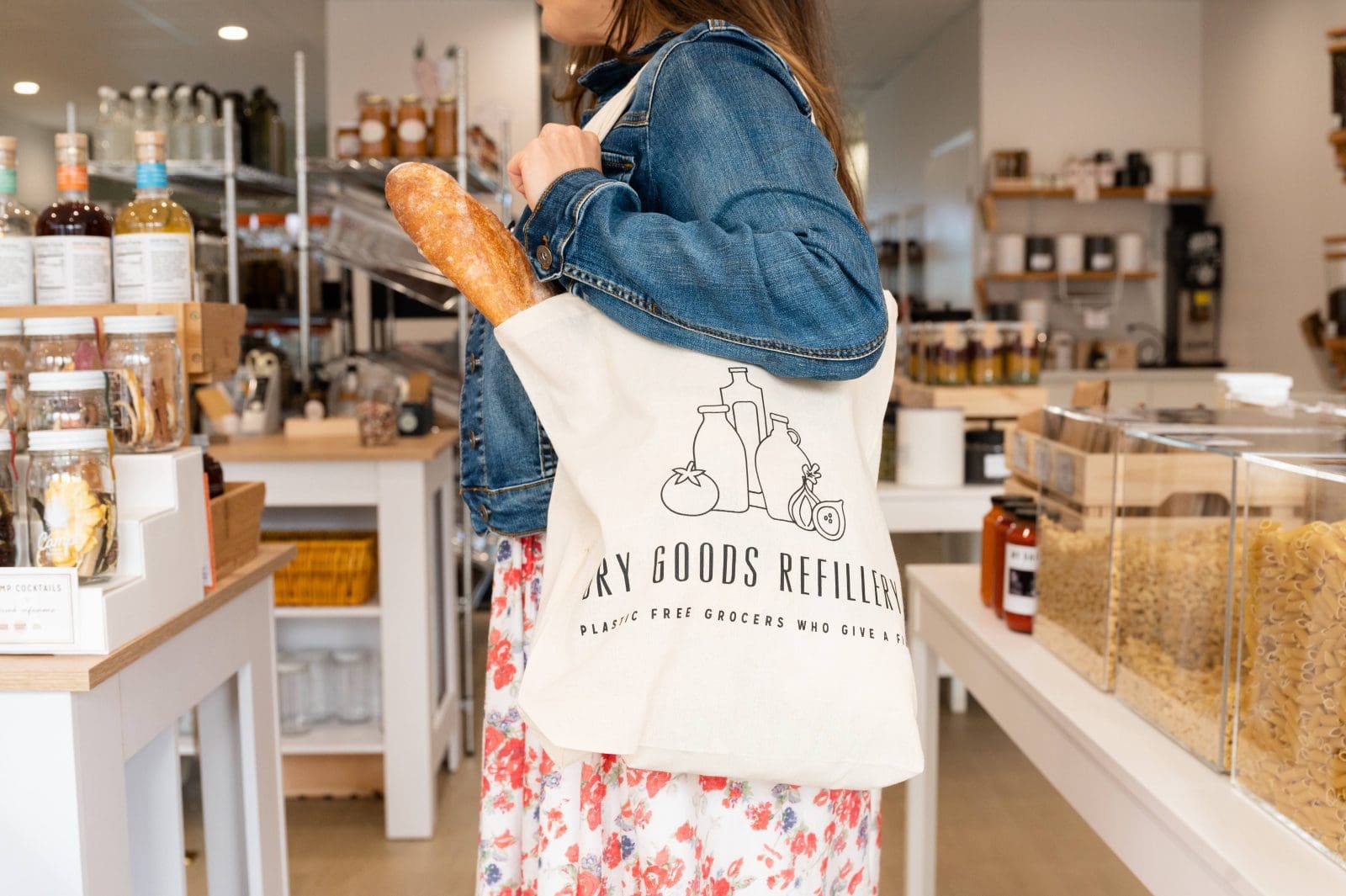
Photo courtesy of Dry Goods Refillery
In your opinion, why is it important to evolve the way we think about packaging products?
Not to sound too grim, but we’ve run out of options. No one is asking anyone to be perfect, but I think we all need to do better. What we’re offering our customers is a chance to see that different options do exist and that there’s a way to be more mindful. Whether you live near a store like ours or not. If you’re shopping in a traditional grocery store, there are decisions that you can make to help move the needle.
We have to be more diligent in our daily lives in finding where we can make some sort of compromise or change. Things like this upcoming plastic bag ban are really great. There’s a lot more work to be done—but if nothing else, it can bring a little bit more mindfulness around the topic and make people rethink their choices.
The biggest challenge is getting people to create new habits. At our store, we don’t pretend to be perfect. We push consistency over perfection. It’s about finding something that works for you that you can do week-to-week or month-to-month that will help drive down the waste. Over time, it does actually create an impact. Even though, at the moment, it may feel like something small.
You mentioned New Jersey’s upcoming plastic bag ban. What do you hope the outcome of this initiative will be? What are the potential positives and negatives?
I hope that the ban encourages people to see something that’s not always easy to recognize. Something as simple as when you go to a regular supermarket or CVS, everyone just wants to throw every single item into a bag. It takes a lot for people to say, “No, I’m ok” or “No, thank you.”
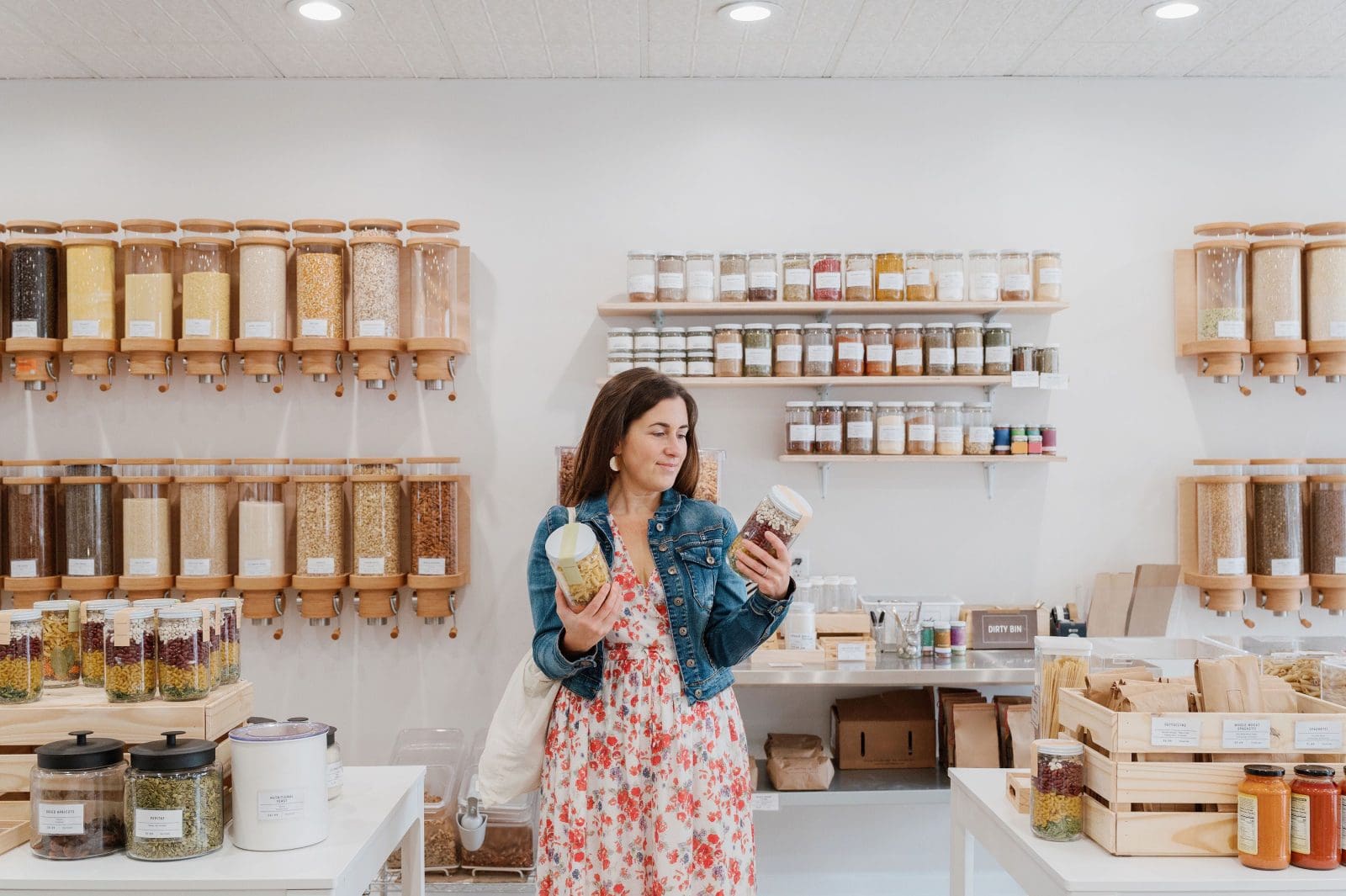
Dry Goods Refillery in Montclair, New Jersey
I also hope the ban creates more conversation, so people start to notice how prevalent single-use plastic really is. I think this is hopefully just the beginning. For me, there’s so much more in terms of takeout containers or just refusing things in your daily life—like a plastic bag from a grocery store or condiments and chopsticks in your sushi order.
My only fear is that, of course, there are a lot of ways to “greenwash” and benefit from this. For example, selling people reusable tote bags to prepare for the ban. If it’s still plastic and reusable, that’s still not solving the problem. Also, there’s a lot of information about cotton bags and how often they have to be used in order to be a net positive for the environment. I’m not a stickler, but I think we all have plenty of stuff at home. We don’t need to buy anything else for this ban.
Regarding today’s consumers, do you feel this increased awareness surrounding sustainability will actually change their beliefs or behaviors?
We all live busy lives and as much as I wish everyone would just stop in their tracks and revamp their entire way of living, that’s just not the society we’re part of. Even in our business, trying to navigate less packaging, there’s a lot of creativity, hurdles and pushback. It’s not easy because the systems around us just aren’t built for “zero-waste.” That’s just not an attainable thing. And we never really like to use that term because that type of verbiage can be intimidating and isn’t realistic.
What are some of the barriers, if any, for people to shop this way?
I think there’s an assumption that our business is just for wealthy people or that it’s not affordable to shop here. We push back on that by saying that yes, there are certain limitations. We’re not Amazon, therefore, there’s no way to match Amazon’s pricing. But overall, we’re very much in line with other organic grocery stores and products within our community. On top of that, you can just take what you need.
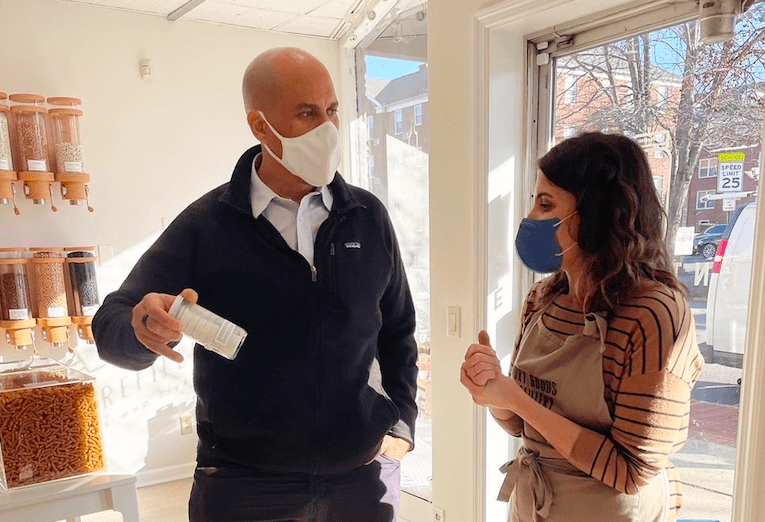
Rachel Garcia of Dry Goods Refillery with Senator Cory Booker
In terms of reducing an individual’s carbon footprint and plastic pollution, what can our role be in tackling this problem?
The easiest and the best thing to do is the one you can stick to. That’s a little bit of a cop-out answer, but it’s really the truth. There are so many ways that individual people can have an impact. If it’s easy for you to start using a reusable water bottle or coffee mug, start with that. If you can commit to cutting down your takeout or refusing plastic utensils, that’s fine. Whatever you think is going to be a change you can stick to, that’s the best choice.
Yes, plastics are a major issue. There’s tons of research about how much plastic is in our water supply. And we don’t even know at this point, living through it, what the long-term effects are of having microplastics in our body. That’s one of my biggest concerns, and certainly something I felt my family was stressed about and could help tackle.
I’m not a lobbyist, a policy expert or a scientist. I’m just a mom trying to do what I know how to do—create a shopping experience within a passionate area for myself, plastic pollution and also food waste. That’s my contribution. I believe people have other strengths, and they should lean into those.
To learn more about what Dry Goods Refillery is doing in Montclair, you can visit their website or check them out on Instagram.
About the Author/s
Abby is The Digest's Managing Editor. She spends her time looking at dogs on Instagram and eating her way around Jersey City.
